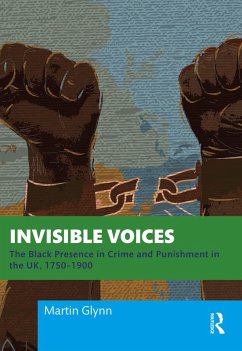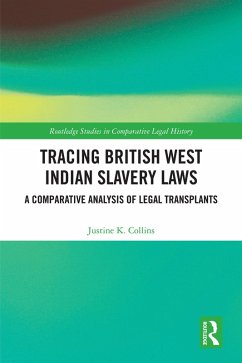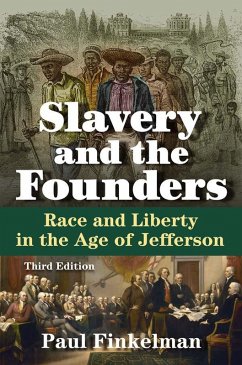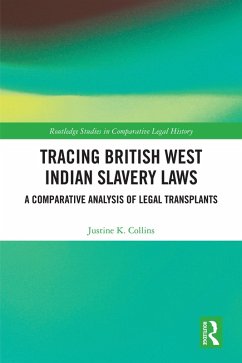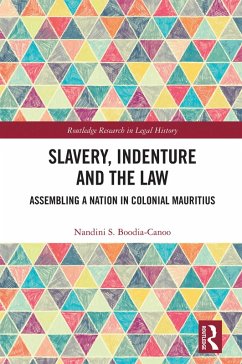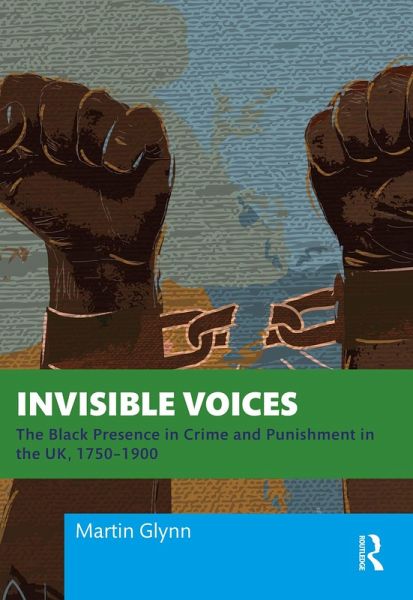
Invisible Voices (eBook, PDF)
The Black Presence in Crime and Punishment in the UK, 1750-1900
Versandkostenfrei!
Sofort per Download lieferbar
38,95 €
inkl. MwSt.
Weitere Ausgaben:

PAYBACK Punkte
19 °P sammeln!
Invisible Voices explores the intersection of criminology and history as a way of contextualizing the historical black presence in crime and punishment in the UK. Through case studies, court transcripts, and biographical accounts it reimagines the understanding/s of the role of history in shaping contemporary perceptions. The book: Moves beyond the confines of presenting 'criminological history' as monocultural Demonstrates how 'mainstream criminology' is complicit in obscuring 'hidden criminological histories' Critically assesses the implications regarding the positioning of 'the black prese...
Invisible Voices explores the intersection of criminology and history as a way of contextualizing the historical black presence in crime and punishment in the UK. Through case studies, court transcripts, and biographical accounts it reimagines the understanding/s of the role of history in shaping contemporary perceptions. The book:
The opening chapters lay the foundation for locating the historical black presence in crime and punishment, whilst offering practical guidance for anyone wanting to pursue the journey of unearthing hidden history. Chapters 5-9 comprise compelling case studies designed to fuel new discussions regarding important excluded voices in crime and punishment history. The following chapters reveal powerful testimonies from those black voices involved in speaking out against slavery during the Georgian and Victorian periods, and highlight the pivotal role played by black activists during significant periods of British history. Chapter 12 explores 'The Black Rage Defence', illuminating a moment in British legal history which tied both the UK and US into a struggle for validating mental health and offending, where race was a significant factor. The final chapter focuses on the need to engage criminologists in a critical dialogue regarding a reimagining of the way criminological history is (re)presented.
Invisible Voices is crucial reading for students not just of Criminology and History, but also Sociology, Cultural Studies, Black Studies and Law, as well as criminal justice practitioners. It also aims to provide scope for A-Level students contemplating going to university, community educational programmes, and prison education departments, as well as anyone wanting to learn more about the black presence in UK history.
- Moves beyond the confines of presenting 'criminological history' as monocultural
- Demonstrates how 'mainstream criminology' is complicit in obscuring 'hidden criminological histories'
- Critically assesses the implications regarding the positioning of 'the black presence' within the discipline of criminology
- Revises current thinking around excluded, marginalized, and muted histories, when looking at 'crime and punishment' as a whole.
The opening chapters lay the foundation for locating the historical black presence in crime and punishment, whilst offering practical guidance for anyone wanting to pursue the journey of unearthing hidden history. Chapters 5-9 comprise compelling case studies designed to fuel new discussions regarding important excluded voices in crime and punishment history. The following chapters reveal powerful testimonies from those black voices involved in speaking out against slavery during the Georgian and Victorian periods, and highlight the pivotal role played by black activists during significant periods of British history. Chapter 12 explores 'The Black Rage Defence', illuminating a moment in British legal history which tied both the UK and US into a struggle for validating mental health and offending, where race was a significant factor. The final chapter focuses on the need to engage criminologists in a critical dialogue regarding a reimagining of the way criminological history is (re)presented.
Invisible Voices is crucial reading for students not just of Criminology and History, but also Sociology, Cultural Studies, Black Studies and Law, as well as criminal justice practitioners. It also aims to provide scope for A-Level students contemplating going to university, community educational programmes, and prison education departments, as well as anyone wanting to learn more about the black presence in UK history.
Dieser Download kann aus rechtlichen Gründen nur mit Rechnungsadresse in A, B, BG, CY, CZ, D, DK, EW, E, FIN, F, GR, HR, H, IRL, I, LT, L, LR, M, NL, PL, P, R, S, SLO, SK ausgeliefert werden.




